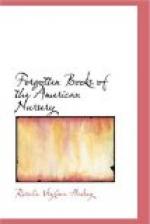Mr. Day’s “Children’s Miscellany” contained a number of stories, of which one, “The History of Little Jack,” about a lost child who was adopted by a goat, was popular enough to be afterwards published separately. It is a debatable question as to whether the parents or the children figuring in this “Miscellany” were the more artificial. “Proud and unfeeling girl,” says one tender mother to her little daughter who had bestowed half her pin money upon a poor family,—“proud and unfeeling girl, to prefer vain and trifling ornaments to the delight of relieving the sick and miserable! Retire from my presence! Take away with you trinket and nosegay, and receive from them all the comforts they are able to bestow!” Why Mr. Day’s stories met with such unqualified praise at the time they were published, this example of canting rubbish does not reveal. In real life parents certainly did retain some of their substance for their own pleasure; why, therefore, discipline a child for following the same inclination?
In contrast to Mr. Day’s method, Mrs. Barbauld’s plan of simple conversation in words of one, two, and three syllables seems modern. Both aimed to afford pleasure to children “learning the elements of reading.” Where Mrs. Barbauld probably judged truly the capacity of young children in the dialogues with the little Charles of “Easy Lessons,” Mr. Day loaded his gun with flowers of rhetoric and overshot infant comprehension.
Nevertheless, in spite of the criticism that has waylaid and torn to tatters Thomas Day’s efforts to provide a suitable and edifying variety of stories, his method still stands for the distinct secularization of children’s literature of amusement. Moreover, as Mr. Montrose J. Moses writes in his delightful study of “Children’s Books and Reading,” “he foreshadowed the method of retelling incidents from the classics and from standard history and travel,—a form which is practised to a great extent by our present writers, who thread diverse materials on a slender wire of subsidiary story, and who, like Butterworth and Knox, invent untiring families of travellers who go to foreign parts, who see things, and then talk out loud about them.”




